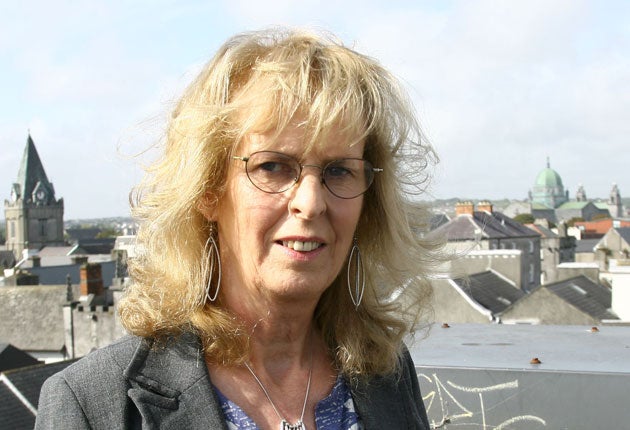Poet forced to pulp book after row with her family

Your support helps us to tell the story
From reproductive rights to climate change to Big Tech, The Independent is on the ground when the story is developing. Whether it's investigating the financials of Elon Musk's pro-Trump PAC or producing our latest documentary, 'The A Word', which shines a light on the American women fighting for reproductive rights, we know how important it is to parse out the facts from the messaging.
At such a critical moment in US history, we need reporters on the ground. Your donation allows us to keep sending journalists to speak to both sides of the story.
The Independent is trusted by Americans across the entire political spectrum. And unlike many other quality news outlets, we choose not to lock Americans out of our reporting and analysis with paywalls. We believe quality journalism should be available to everyone, paid for by those who can afford it.
Your support makes all the difference.A prominent Irish poet has lived up to descriptions of her work as provocative, anarchic and untameable by sparking family divisions with her latest collection.
More than 900 copies of the Galway poet Rita Ann Higgins' book, entitled Hurting God, were pulped by her publisher following objections from her millionaire brother.
He took exception to references in the collection to him and the pair's mother which he and other members of the family characterised as "offensive" and "untrue".
A new version of Ms Higgins' work is now in prospect, with the offending passages removed – at a cost, the publishers say, of thousands of euros. The poet came into conflict with her wealthy brother Joe, a businessman who has served as chairman of Galway airport and developed extensive business interests.
The two are, in different ways, conspicuous achievers who were among the 13 children of a working-class Galway family. The current row has split the family almost down the middle, with seven of the 12 surviving children siding with Joe.
According to Ms Higgins, the episode began when she gave an advance copy of the book, which is described as "part-essay, part-rhyme," to one of her sisters.
"I had related a family anecdote about my brother, and my mother's reaction to the situation back then," she told The Irish Times.
"My brother Joe was very angry about a reference to him in the opening essay. He was very upset and angry. He said, 'Are you going to stop this or will I?'
"I understood from what he said that he meant that he would seek an injunction. I've never had a cross word with Joe. I'm very sad about the whole thing."
Eight members of the Higgins family said they were "pleased to learn that an offensive statement concerning our mother, and untrue statements concerning other family members, have been removed from Rita Ann's new book."
The eight added: "We regret that the book had to be reprinted.
"This situation could easily have been avoided had the facts been checked with the family members concerned. It saddens us to have to issue this statement."
Ms Jessie Lendennie of Salmon Poetry publishers said that reprinting the books had been expensive. She added: "However, it would have been worse if the book could not have been published. I want to emphasise Rita Ann's right to her own personal memories and of course our right to publish excellent literature. The nature of memoir is that it is told from a single perspective," she said.
Ms Higgins has won many awards and been writer-in-residence at universities and other centres. She is a member of Aosdana, an Irish institution which honours figures who have made an outstanding contribution to the arts.
This is not the first time that the work of Ms Higgins, which was described by one critic as "caustic, troublemaking poetry", has led to disagreements with family members and others. A newspaper article written in 2001, which details disagreements with a university, a prison and her father, who was upset by her writings, is featured prominently on her own website.
It also outlines a controversy with Ms Higgins's brother-in-law, Michael Mullins, who objected that she had not told him she had written and published a poem about his son, who had committed suicide.
He objected to what he described as the "unnecessarily graphic, cold and hurtful nature" of passages which he said "could have been rewritten so as not to cause distress and offence".
Join our commenting forum
Join thought-provoking conversations, follow other Independent readers and see their replies
8Comments